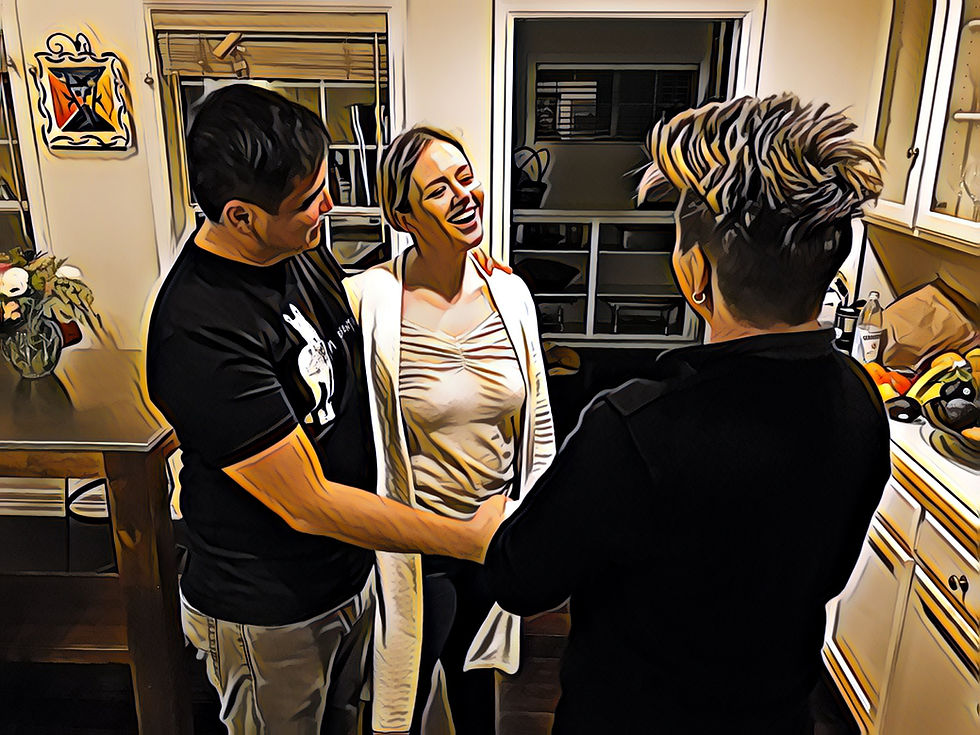The Number 1 Killer of Joy
- Nov 16, 2019
- 6 min read
Updated: Sep 25, 2020
Many of us are not even aware that it's happening. We simply feel tired, defeated, retracted, and sensitive. It can go on for days where we don't have much energy to even get up in the morning, weighted down by this invisible thing that has taken over the subconscious part of our mind. For some people this is a normal state of being while others around them seem to be much happier.
What is keeping us from experiencing more joy in life? People are told that life has its “ups and downs,” and many of us believe that joy is surely not meant to be felt all the time. Yet, recently I’ve started an inquiry process that centers around this one question: regardless of the ever-changing circumstances of my life, is there a shift that I can make internally that would allow me to feel joy all the time?

I started my search to answer this question by reviewing my past. By wondering about my upbringing, I realized that I learned from a young age how to master self-criticism, judgment and criticism of others. I grew up in an environment where boys and men were taught to be tough. The fastest way to thicker skin was to both endure and dish out condemnation and disapproval. I remember feeling confused about the purpose of this consistent criticism, as if there was an unspoken agreement that it was a form of endearment. Putting someone down was meant to show them that you cared and wanted to see them improve. The ability to put others down was often accompanied by a feeling of pride around being a critical thinker. Yet, I also watched this intended endearment or critical expression get spiraled into hurt feelings, disconnection and resentment in my family. I remember watching my Grandfather put my father down and my father treat me similarly. I now see how my own thoughts have been regularly flooded with criticism of myself and others.
I realized that my learned predisposition to criticism was the number one habit robbing me of the ability to feel consistent joy. With further research, I found a range of scientific evidence to back this up. Criticism was designed as a shortcut to help early humans evaluate, store and review information for survival and safety. Yet as our society has evolved, our brains have over-learned criticism of ourselves and others. According to research in the US, Canada, Israel, and Europe [1], this unhealthy form of criticism has been identified as a key component of depression, anxiety, eating disorders, substance abuse, physical health conditions, and even suicide.
Self-criticism derails people’s social environments. It propels them to generate interpersonal stress and it interferes with the ability to experience positive, enjoyable life events [2].
Research is showing that our higher-order cognitive controls that enable problem solving become impacted and limited by self criticism [3].
The inner critic cannot operate at the same time as creative flow. The area of the brain responsible for criticism and self-monitoring is deactivated at the height of creative expression [3].
During creative flow, the dorsolateral prefrontal cortex (DLPFC), the part of the brain charged with self-monitoring and impulse control, goes quiet. The DLPFC holds our inner critic, that voice of doubt and disparagement. As a result, with this area de-activated, we’re far less critical and far more courageous, both augmenting our ability to imagine new possibilities and share those possibilities with the world [4].
A habit of criticism of self and others stems from our childrearing and social influences. According to a 25-year study [5] of infants, children learn how to behave by passively imitating parents and other children. These habits get stored in the unconscious part of the brain and shape adult behavior. Those deeply stored preferences, feelings, intuitions, and gut reactions become unconscious guides for the present. Like me, many people have learned a predisposition to critical, rather than appreciative ways of thinking about self, others and even life.

So, if it’s emerging for you that you might be one of these people with a predisposition to criticism, and you notice that unhealthy criticism is hurting both your self-esteem and your relationships with others, how do you reverse it?
The antidote to criticism is appreciation. Appreciation leads to joy and daily practice can help sustain lifelong joy. If you want more joy in your life, it is important to overcome unhealthy criticism by developing a practice of authentic appreciation first for yourself and then for others. Generating a state of awe and wonder opens the doors, windows, closets and dusty attic to appreciation.
A one-time act of thoughtful appreciation produced an immediate 10% increase in happiness and 35% reduction in depressive symptoms [6].
Appreciation lowers blood pressure. Negative emotions create a chain reaction in the body—blood vessels constrict, blood pressure rises, and the immune system is weakened [7].
Appreciation is a much better motivator. 80% are willing to work harder for an appreciative boss, and 70% said they’d feel better about their efforts if their boss thanked them more regularly [8].
Appreciation increases mental strength by reducing stress and has been linked as a key to overcoming trauma. A 2006 study found that Vietnam War Veterans with higher levels of gratitude and appreciation experienced lower rates of Post-Traumatic Stress Disorder [9].
Grateful people report feeling healthier than others, noticing they experience fewer aches and pains in the body [10].
Sleep improves with positive emotions of appreciation and gratitude, activating the parasympathetic branch of the nervous system, initiating the relaxation response [11].
Criticism activates the sympathetic branch, often referred to as the fight-or-flight response. Appreciation and gratitude have been shown to reduce the time required to fall asleep, increase sleep quality and sleep duration [11].
So why aren’t we moving away from criticism and thriving in a life of appreciation and gratitude? As a teenager I felt challenged to appreciate myself and others. Thinking it would make me appear or feel weak, I was scared that somehow by appreciating someone they might think they were better or more important than me. Self-appreciation felt especially awkward, for fear of inflating my own ego (i.e., getting too full of myself). And what I realize now is that none of this is true, yet many others believe the same, preventing them from developing a practice of gratitude and appreciation.
If you are interested, here's an appreciation practice as a way to begin shifting away from self-criticism. Each evening write down 5 things you appreciate about yourself and when you feel comfortable, share 5 things you appreciate about another. Tell them you are working on creating a habit of appreciation. Even if they are small appreciations, find a way to move beyond the critical voice. Consider joining the appreciation challenge on the Foundation for Conscious Living website.
It has taken years of practice to cognitively restructure my internal self-talk, to generate self-appreciation and allow others to appreciate me without brushing it off. By practicing appreciation daily, I have opened the doors to giving and receiving more appreciations to and from others with more ease. My relationships are stronger and more loving. A life based in appreciation now feels so much better than one guided by criticism. When I fall out of practice, I simply recommit to appreciating. This practice of appreciation opens a deeper level of presence and awareness of myself, others and my surroundings bringing much more joy in my life.
This article was inspired by the amazing work of Katie and Gay Hendricks https://hendricks.com
References:
[1] Shahar, G. (2015). Erosion: The psychopathology of self-criticism. New York, NY: Oxford University Press.https://bmcpublichealth.biomedcentral.com/articles/10.1186/1471-2458-11-642
[2] Shahar, G. (2015). Erosion: The psychopathology of self-criticism. New York, NY: Oxford University Press. https://bmcpublichealth.biomedcentral.com/articles/10.1186/1471-2458-11-642
[3] The Effect of Criticism on Functional Brain Connectivity and Associations with Neuroticism https://journals.plos.org/plosone/article?id=10.1371/journal.pone.0069606
[4] Kotler, S. (2014) The Rise of Superman: Decoding the Science of Ultimate Human Performance
[5] The imitative mind: Development, evolution, and brain bases. Cambridge University Press; New York: 2002 https://www.ncbi.nlm.nih.gov/pmc/articles/PMC2440575/#R36
[6] Seligman, Martin E. P.: Positive Psychology Progress: Empirical Validation of Interventions, University of Pennsylvania https://psycnet.apa.org/record/2005-08033-003
[7] Emmons, Considering that, it’s no wonder gratitude has been shown to lower blood pressure https://health.ucdavis.edu/welcome/features/2015-2016/11/20151125_gratitude.html
[8] Glassdoor Team, Employers To Retain Half Of Their Employees Longer If Bosses Showed More Appreciation; Glassdoor Survey
[9] Kashdan T. et alGratitude and hedonic and eudaimonic well-being in Vietnam war veterans https://www.ncbi.nlm.nih.gov/pubmed/16389060
[10] Hill P. et al.Examining the Pathways between Gratitude and Self-Rated Physical Health across Adulthood https://www.ncbi.nlm.nih.gov/pubmed/23139438
[11] Nancy D. et al. Effects of Constructive Worry, Imagery Distraction, and Gratitude Interventions on Sleep Quality: A Pilot Trial https://onlinelibrary.wiley.com/doi/abs/10.1111/j.1758-0854.2011.01049.x























Comments